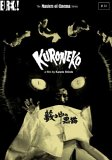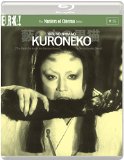 Kuroneko | DVD | (20/08/2005)
from £26.98
| Saving you £-6.99 (N/A%)
| RRP
Kuroneko | DVD | (20/08/2005)
from £26.98
| Saving you £-6.99 (N/A%)
| RRP A companion piece to his 1964 classic 'Onibaba' this is another stylish ghostly folk tale from Kaneto Shindo shot in dreamy black and white Tohoscope with another eerily menacing score from Hikaru Hayashi. Delving beyond the superficial Shindo once again examines class conflict as the arrogant Samurai elite rape and murder a woman and her daughter-in-law only to find that as shape-shifting demons the wronged peasant women will exact a terrifying revenge...
![Zatoichi In Desperation [1972]](/pictures/1002830.jpg) Zatoichi In Desperation | DVD | (02/02/2003)
from £N/A
| Saving you £N/A (N/A%)
| RRP
Zatoichi In Desperation | DVD | (02/02/2003)
from £N/A
| Saving you £N/A (N/A%)
| RRP On his ceaseless journey Zatoichi crosses paths with an old woman on an ancient bridge. Unintentionally causing her death Zatoichi charges himself with the task of finding the old woman's daughter Nishikigi to give her the tragic news. The blind swordsman sets off to the town of Chosi. There he finds the daughter working in a geisha house and a bond of fifty ryo has her trapped until it has been repaid. The town is ruled over by an ambitious boss Mangoro who has bullied the
 KURONEKO (Masters of Cinema) (BLU-RAY) | Blu Ray | (24/06/2013)
from £N/A
| Saving you £N/A (N/A%)
| RRP
KURONEKO (Masters of Cinema) (BLU-RAY) | Blu Ray | (24/06/2013)
from £N/A
| Saving you £N/A (N/A%)
| RRP Shindo's stylish black-and-white ghost story forms a companion piece to his earlier film Onibaba. Once again we have a woman and her daughter-in-law preying on a lone samurai. But the mood here is a little gentler and more poignant than we are accustomed to. The two women are victims of a brutal gang of samurai: they are raped and killed and fire is set to their hut. But when their cat licks the blood from their corpses, they are transformed into shape-shifting demons that favour the form of black cats. Waylaying benighted warriors, they wreak their revenge. A champion samurai is sent against them, but he finds the monsters he's hired to destroy are his own wife and mother. Shindo skilfully builds an atmosphere of eerie menace--draperies waving in the wind, Hikaru Hiyashi's score mimicking the desolate caterwauls that precede each killing. Shindo, faithful as ever to his left-wing principles, includes a strong measure of barbed social comment in his portrayal of the arrogant samurai class. --Philip Kemp

Please wait. Loading...
This site uses cookies.
More details in our privacy policy